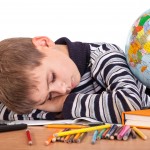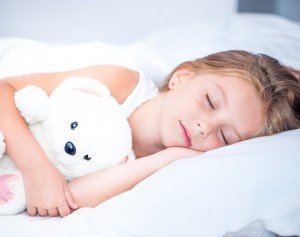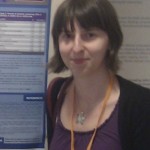
Good sleep is a crucial part of our physical and mental well-being. We typically spend about a third of our lives asleep but when we miss out on sleep, we can feel fatigued and struggle to concentrate. Sleep problems are generally quite common and have been reported as one of the most common health conditions in individuals with attention deficit hyperactivity disorder (ADHD).
It is possible that sleep disturbances make ADHD symptoms worse in affected children and adolescents or even result in ADHD-like behaviours. As such, it is important to consider treatment of sleep problems in children and adolescents with ADHD. Improving sleep quality has the potential to reduce ADHD problems and to have a positive impact on everyday life of the affected individuals, as well as their families.
Methods
In order to perform a clinical review of the research literature on the assessment, treatment and management of sleep problems in children with ADHD, the authors of a recent literature review searched a number of databases (PubMed, EMBASE, and Web of Knowledge) for relevant research. The literature search turned up 139 relevant articles, 22 of which directly assessed treatment of sleep problems in children with ADHD.
The authors summarised the literature and provided recommendations in terms of how sleep problems in ADHD should be assessed and treated. Where the reviewed articles presented evidence-based recommendations for treatment of sleep problems in ADHD, the authors assessed the quality of this using the SIGN criteria and presented recommendations with a note about the strength of this evidence. Where such empirical evidence was lacking, the authors presented their consensus view of possible recommendations. The Consensus Conference where these recommendations were agreed was supported by an unrestricted educational grant from Shire Pharmaceuticals.
-

This review stresses the importance of screening for sleep problems when initially assessing a child with ADHD.
Results
Sleep problems & possible risk factors
The most common types of problems reported included bedtime resistance, difficulties with falling asleep or waking up, night awakenings, sleep breathing problems and daytime sleepiness.
The authors report that possible causes of sleep problems may include specific sleep disorders (for example sleep apnea or “restless legs syndrome”), poor sleep routines, oppositional and defiant behaviours, anxiety or mood problems, medical conditions (for example asthma), side effects of ADHD medications or the ADHD symptoms themselves.
Recommendations for assessment
The authors make the following recommendations for clinical practice:
- Baseline screening for presence of sleep difficulties at the initial assessment of ADHD symptoms in a child. This could include use of screening questionnaires such as “BEARS” or the Children’s Sleep Habits Questionnaire
- If medication is prescribed, it is important that changes in sleep be monitored at follow-up appointments, as these may be side effects of the medication
- If any sleep problems are suspected, it is recommended that a 2-week sleep diary is used by the parents and/or young person to record sleeping habits
- If necessary, other tests could be used to follow-up and diagnose the problem, including:
- Polysomnography: recording of brain activity, body movement, breathing and heart rate during sleep
- Actigraphy: using a wristwatch-like device to monitor cycles of rest and physical activity throughout the day
- Infrared video camera: monitoring body movements during sleep (in the dark)
Recommendations for treatment
Before other methods are considered, the authors stress that it is important to try to implement healthy sleep practices, such as:
- Maintaining a regular routine for sleep
- Allowing sufficient time for sleep depending on the age of the child or young person
- Encouraging the child to do relaxing things before bedtime

Children with ADHD who have trouble sleeping are likely to benefit from relaxing pre-bedtime activities like story time.
Such behavioural strategies should ideally be adapted for children with ADHD (for example by providing the instructions for the routine one step at a time). Although such strategies may be necessary steps in improving sleep, the authors state that they may not be sufficient for all children.
If behavioural treatments are not effective, for example in cases of insomnia, use of orally-administered melatonin may be considered, as there are several drug trials showing the benefits of this medication. There is currently no robust evidence for the effectiveness of other medications.
If it is suspected that sleep problems are the side effects of medications, the authors point out that it could be worth trying alternative dosages, dose regimens, formulations, different medications, or administering melatonin alongside the other medication (recommendation based on clinical consensus of authors).
Co-occurring disorders (such as anxiety or oppositional behaviours), which may be affecting sleep need to also be considered and treated (recommendation based on clinical consensus of authors).
Specific sleep problems
- Circadian Rhythm Sleep Disorders: If a CRSD is diagnosed, there is some preliminary and weak evidence (from case reports) for the use of light therapy or chronotherapy, with stronger evidence (based on 2 randomised-controlled trials) for the use of melatonin.
- Sleep Disordered Breathing: The recommended treatment for this is adenotonsillectomy, which is an operation to remove both the adenoids and tonsils. The evidence for this treatment is moderate and comes from 2 non-randomised studies.
- Restless Legs Syndrome and Periodic Limb Movement Disorder: Beneficial treatments may include physical exercise and avoiding substances such as caffeine or alcohol. There is also some weak evidence from one study for the use of oral iron supplements.
Strengths and limitations
The authors did not include their search strategy in the review (apparently it’s available on request), so it’s hard to say whether or not their search was systematic and reliable. They also say that they decided not to include unpublished studies ”because, as pointed out by the Cochrane group, the inclusion of unpublished data may introduce bias”. In fact, the Cochrane handbook clearly states that “obtaining and including data from unpublished trials appears to be one obvious way of avoiding this problem [bias]”, although it also warns that “inclusion of data from unpublished studies can itself introduce bias” if the sample included is unrepresentative of all included studies.
The authors highlight a number of sleep problems and treatment options which could really benefit from further research. There is currently very little evidence for the effectiveness of many of the possible treatments, perhaps aside from melatonin, which appears to have been more widely researched in the context of ADHD.
Where the evidence was weak, they provide recommendations based on their clinical experience, which were agreed at a Consensus Conference supported by an unrestricted educational grant from Shire Pharmaceuticals, a company who produce drug treatments for ADHD among other things.
They also mention a number of ongoing RCTs into behavioural strategies in ADHD, which will be of interest once their results are published.
Conclusions
Sleep problems are very common in children and adolescents with ADHD and making an accurate diagnosis is important.
The authors highlight that:
Before addressing the specific sleep disorder/condition, we recommend the implementation of healthy sleep practices as the foundation of sleep problems management.
In addition to behavioural strategies, the most robust support comes from the use of orally-administered melatonin. To date, there is limited evidence for other medications and for non-pharmacological therapies (behavioural, light therapy or chronotherapy).
It appears that it is early days for this research area. Hopefully, as further research is carried out, appropriate treatments will be found for the many children with ADHD who suffer from sleep problems.

This review argues that healthy sleep practices should be the mainstay of treatment
Links
Cortese S, Brown TE, Corkum P, Gruber R, O’Brien LM, Stein M, Weiss M, Owens J. Assessment and Management of Sleep Problems in Youths With Attention-Deficit/Hyperactivity Disorder. J Am Acad Child Adolesc Psychiatry. 2013 Aug;52(8):784-96. doi: 10.1016/j.jaac.2013.06.001.
Owens, J. A., & Dalzell, V. (2005). Use of the ‘BEARS’ sleep screening tool in a pediatric residents’ continuity clinic: a pilot study. Sleep medicine, 6(1), 63-69.
Owens, J. A., Spirito, A., & McGuinn, M. (2000). The Children’s Sleep Habits Questionnaire (CSHQ): psychometric properties of a survey instrument for school-aged children. SLEEP-NEW YORK-, 23(8), 1043-1052.
Wikipedia article on Polysomnography.
Wikipedia article on Actigraphy.


ADHD and the importance of healthy sleep: Good sleep is a crucial part of our physical and mental well-being. … http://t.co/RDwGUXeJEd
ADHD and Healthy sleep. @Mental_Elf http://t.co/KD07Vh3idK
“ADHD and the importance of healthy sleep” http://t.co/9K4dEAVhEF http://t.co/J3MQqku8tn
@trufflesquirrel flags up a clinical review on the assessment & management of sleep problems in children with ADHD http://t.co/D64u152XZf
Review suggests healthy sleep practices should be mainstay of #ADHD treatment, reports @joannamphd http://t.co/pXyN3Esgpy #mentalhealth
Review says that healthy sleep practices should be the mainstay of treatment for children with ADHD & sleep problems http://t.co/D64u152XZf
Review stresses the importance of screening for sleep problems when initially assessing a child with ADHD http://t.co/D64u152XZf
Children with ADHD and sleep problems should maintain a regular routine for sleep http://t.co/D64u152XZf
“@Mental_Elf: Children with ADHD and sleep problems should maintain a regular routine for sleep http://t.co/iHcN8V2362” as should we all :-)
MT @Mental_Elf: The importance of screening for sleep problems when initially assessing a child with ADHD http://t.co/csEWHXWGEe
RT @Mental_Elf: Children with ADHD and sleep problems should be encouraged to do relaxing things before bedtime http://t.co/D64u152XZf
In case you missed it: #ADHD and the importance of healthy #sleep http://t.co/D64u152XZf
RT @Mental_Elf: Review says healthy sleep practices shd be mainstay of trtmnt for children w ADHD & sleep problems http://t.co/mH8tdOyVpF
ADHD and the importance of healthy sleep – The Mental Elf Blog http://t.co/hc6NeK8x8t
Mental Elf: ADHD and the importance of healthy sleep http://t.co/8fHvbrDAPl
ADHD and healthy sleep – http://t.co/abbLhGLgkh by @Mental_Elf As dad for 3, I know a sleep deprived child is a difficult child
@medskep @Mental_Elf
http://t.co/MHzIu5EvFl
Blog post by me for @Mental_Elf – #ADHD and the importance of healthy #sleep http://t.co/us0K6UZnu5
ADHD & healthy sleep – http://t.co/YHmIbaEgtO by @Mental_Elf @ADHD_LANC has just begun to offer a sleep asst service for pts – v important